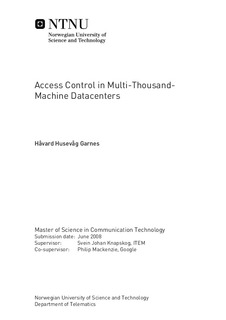Access Control in Multi-Thousand-Machine Datacenters
Abstract
Large data centers are used for large-scale high-performance tasks that often includes processing and handling sensitive information. It is therefore important to have access control systems that are able to function in large-scale data centers. This thesis looks into existing solutions for the authentication step of access control in large data centers, and analyses how two authentication systems, Kerberos and PKI, will perform when employed on a larger scale, beyond what is normal in a large data center today. The emphasis in the analysis is on possible bottlenecks in the system, computational power spent on access control routines, procedures for administration and key distribution and availability of extension features needed in large scale data center scenarios. Our administration analysis will propose and present possible methods for initial key distribution to new machines in the data center, as well as methods for enrolling new users. We will also propose a method for automatic service instantiation in Kerberos and present a method for service instantiation in PKI. We will look at how the systems handle failed machines in the network, and look at how the systems handle breaches of trusted components. Our performance analysis will show that under given assumptions, both Kerberos and PKI will handle the average load in a hypothetical data center consisting of 100000 machines and 1000 users. We will also see that under an assumed peak load, Kerberos will be able to handle 10000 service requests in under 1 second, whereas the PKI solution would need at least 15 seconds to handle the same number of requests using recommended public key sizes. This means that some programs may need special configurations to work in a PKI system under high load.
